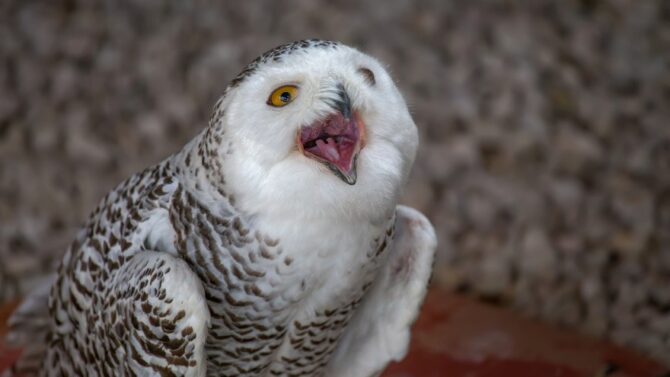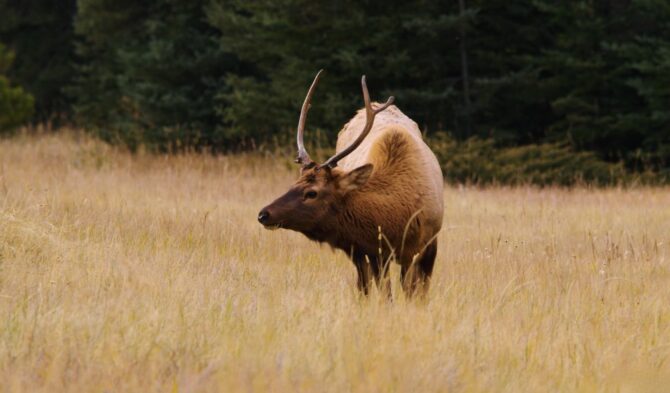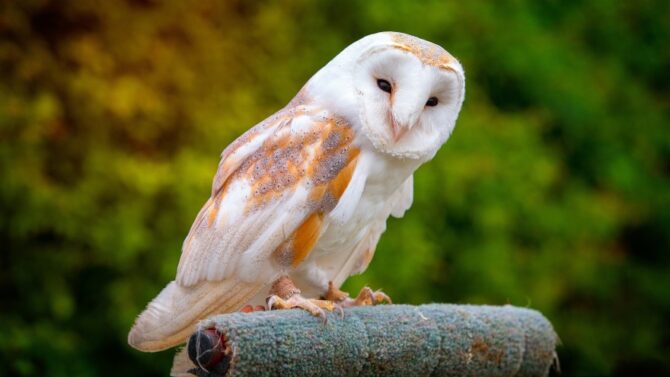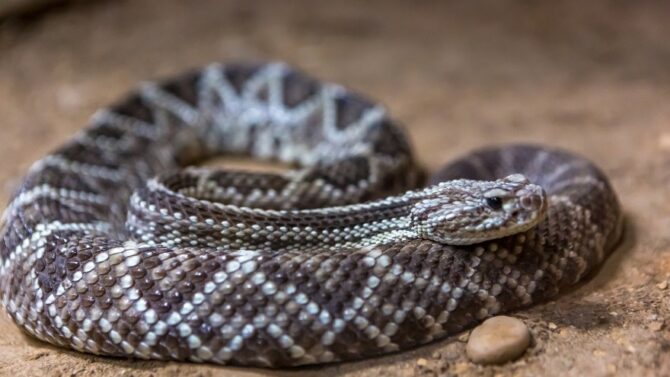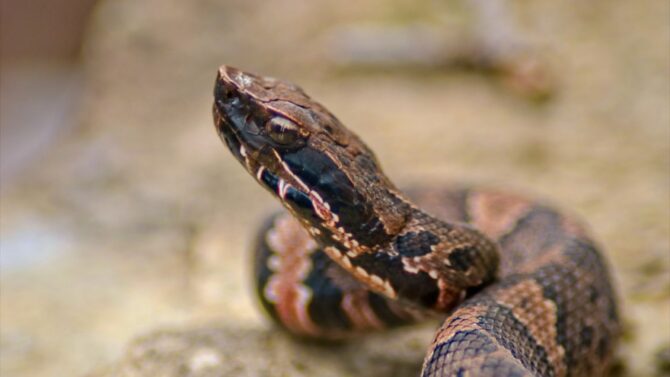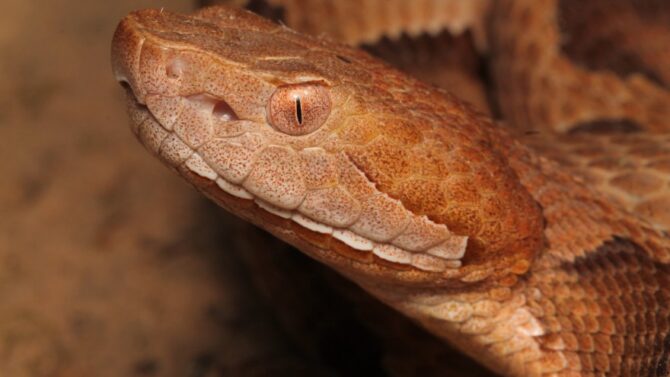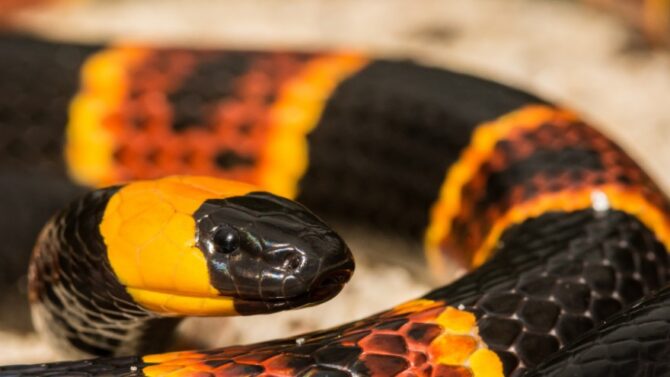California is a state in the Western United States known for its diverse wildlife, many of which are birds.
Among these feathered residents are several birds that sing at night in California. These night singers and chirpers include species like the common poorwill, the western screech owl, the great horned owl, and so on.
But why do these birds sing at night?
In this article, we will explore the reasons behind this nighttime behavior and delve into the fascinating world of these avian night singers.
But that’s not all.
This article will also share tips on how to prevent the songs or chirps of these birds from keeping you awake at night.
Ready to explore all of these?
Well, then, let’s dive right in!
Nine Birds That Sing at Night in California
Hearing birds singing in the middle of the night can evoke various emotions, from annoyance to pleasure.
Regardless of what emotion it inspires, if it occurs frequently, one may become curious about the source of the singing.
If you live in California and often hear birds singing at night, chances are they are one of the birds below.
1. Northern Mockingbird
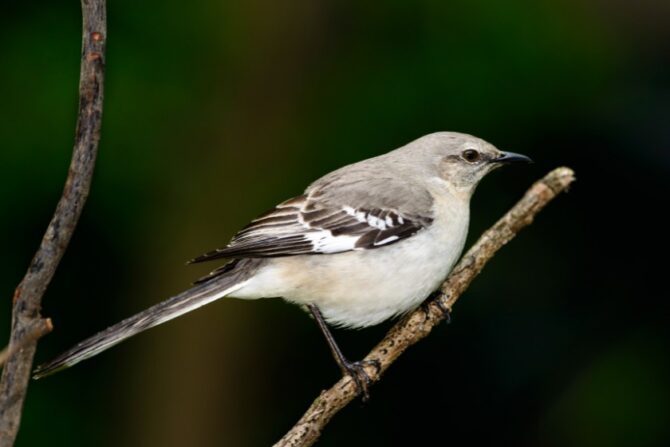
The northern mockingbird is a songbird known for its ability to sing, especially at night.
This bird species is often the reason many people’s sleep gets interrupted at night in California and several other regions.
Northern mockingbirds are commonly found throughout the United States, Mexico, Canada, and the Caribbean.
Male mockingbirds, particularly young ones or those who have lost their mates, are the most likely to sing at night in an attempt to attract a female.
However, they may also sing for other reasons.
The northern mockingbird’s singing ability is truly remarkable.
For instance, it can use rasps, trills, shrills, scolds, and whistles in its vocalization and can even imitate the sounds of other birds, animals, and even car alarms and creaky doors.
Northern mockingbirds can learn up to 200 songs in their lifetime,1 and while both sexes can sing, unpaired males are the most persistent singers.
These males can sing for up to 24 hours during the breeding season.
While northern mockingbirds are usually the culprit for nighttime singing in California, other birds are known to sing at night, as you’ll find in the rest of this article.
2. Owls
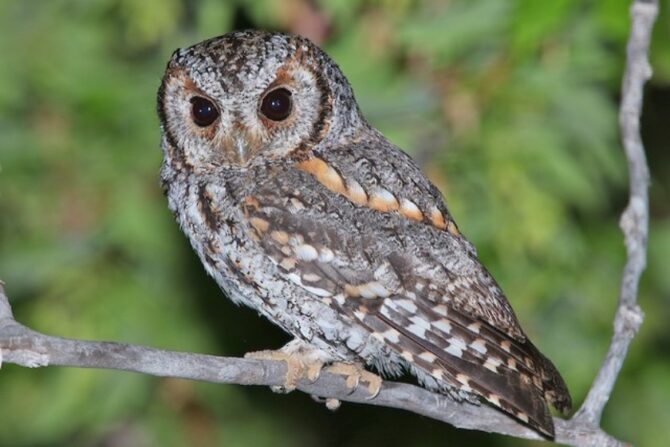
California is home to a diverse population of owls, including the barred owl, burrowing owl, California spotted owl, flammulated owl, great gray owl, and many other species.
Owls are generally nocturnal birds that tend to make their calls at night.
Individuals usually sing alone, but during courtship and breeding season, they may sing with other owls.
It’s also worth mentioning that two owls can hoot throughout the night without stopping or getting tired.
While the sound of an owl’s call may not be entirely unpleasant, hearing it over and over can still be frustrating, especially at night when you want a peaceful sleep.
One of the most commonly heard night-singing owls in California is the western screech owl.
These small owls are known for their distinctive trilling calls, which can often be heard in residential areas.
They are found throughout California and are especially common in wooded areas and near wetlands.
3. Common Poorwill
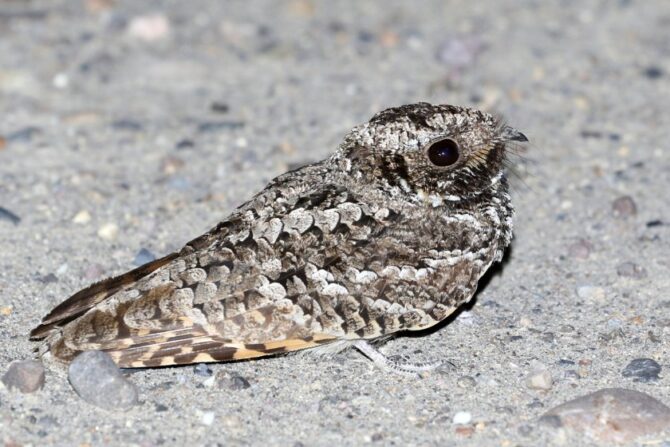
The common poorwill, a member of the nightjar family, is a nocturnal bird species commonly found in California.
These small gray-brown birds mostly live in the deserts and chaparral regions of the state and are known for making calls and whistles that sound like “poor will” at night.
When the common poorwill makes these calls, it’s usually to attract a mate or establish its territory.
The bird’s soft, whistling calls can be heard on summer nights in the western regions of California.
4. Yellow-Breasted Chat
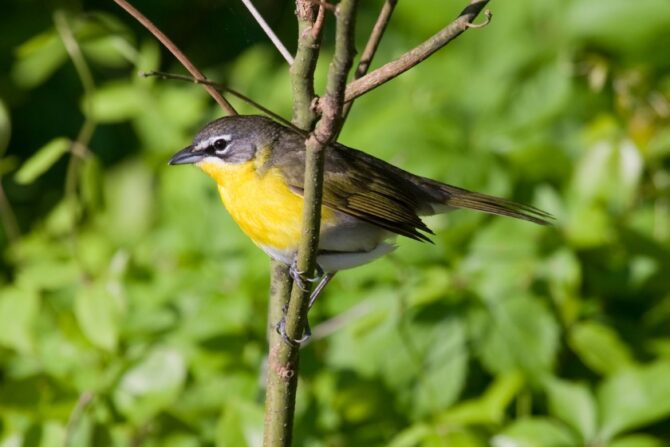
The yellow-breasted chat is an unusual bird species in that it is diurnal yet known to sing at night.
This bird has a variety of sounds, such as raspy songs, warbling chirps, and whistling chatters that are quite loud during the day.
While yellow-breasted chats are generally diurnal, males often sing at night, particularly during the breeding and migration season in California.
Unfortunately, this can be frustrating for residents, especially as the birds’ songs are a unique combination of cackles, clucks, whistles, and hoots.
Some have even compared their vocalizations to mocking laughter.
5. Killdeer
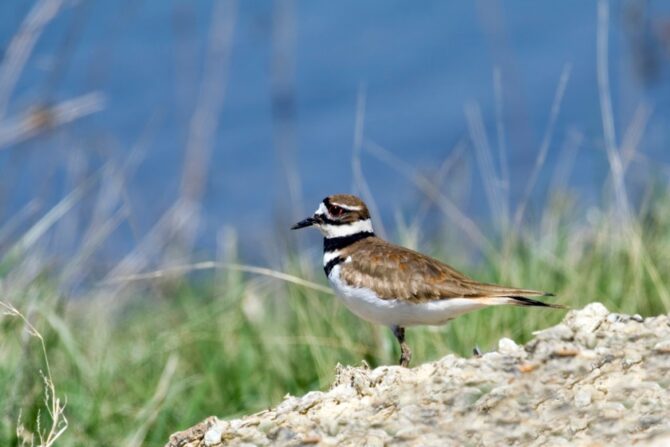
Unlike the previously mentioned birds, killdeers are not as commonly found in California, particularly in urban areas.
However, you may be lucky enough to hear their calls if you live near a natural reserve or a water channel.
These shorebirds make a distinctive, frantic-sounding call that can be heard anytime during the day.
It’s worth noting that while the calls of a killdeer might not be considered a song, it is still disruptive and can keep you up at night.
6. Western Meadowlarks
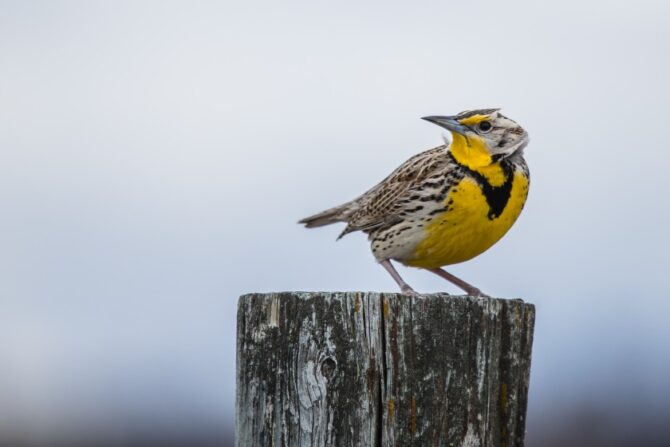
Another bird species you may hear singing in California, although less commonly than the Northern mockingbird, is the western meadowlark.
These birds are known for their beauty and loud vocalizations.
During mating season, male meadowlarks sing and chirp at night to attract mates and defend their territory against competitors.
You are more likely to hear these birds singing if you live outside of the major metropolitan areas of California, as they prefer to inhabit more open locations.
So, if you hear birds singing in any residential and urban areas of the state, it is unlikely to be a western meadowlark.
7. American Robin
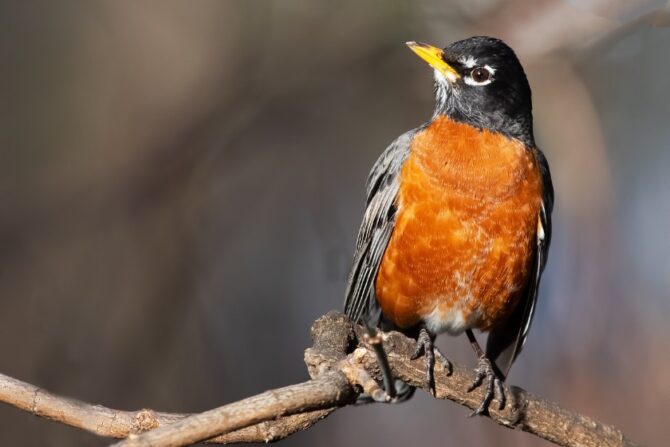
The American robin is a bird that can be found in many places, including California.
Typically, these birds sing melodious songs at dawn, but they may mistakenly sing through the night due to light pollution.
American robins are particularly known for singing during their courtship rituals in the spring, but it’s possible to hear them singing all year round.
These birds are a familiar sight during the day and are often seen even in busy cities.
However, they are not known to naturally sing at night like other birds on this list.
Unfortunately, they are vulnerable to light pollution, and bright city lights can cause confusion, making them confuse night for day and sing accordingly.
A 2006 study documented this phenomenon,2 and the researcher noted that he chose robins as his subject because they are not known to naturally sing at night.
8. Common Nighthawk
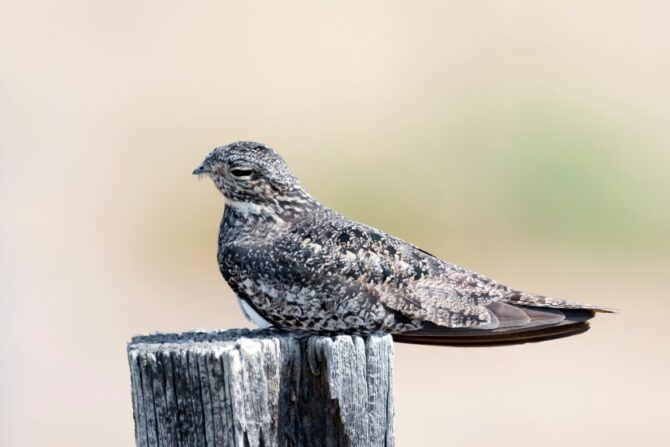
Another bird species known to sing at night in California is the common nighthawk.
These large, aerial birds are characterized by their loud, booming calls that can be heard during the summer months, particularly at dusk and dawn.
They are found throughout California and are often observed flying low over fields and meadows.
9. Black Phoebe
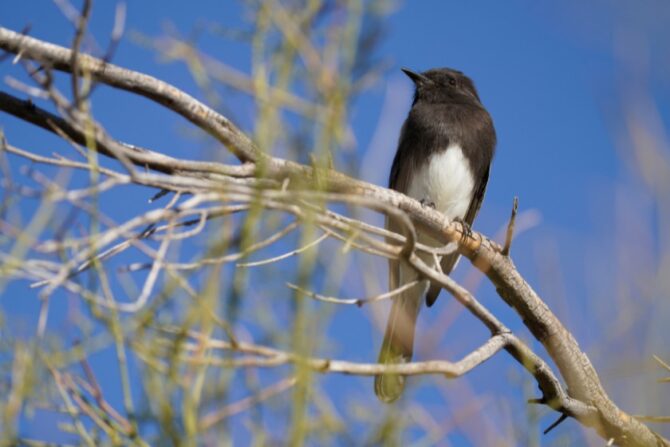
The black phoebe is another bird species that can be heard singing at night in California.
These birds are known for their loud, clear call and often sing at night to defend their territory.
The sharp whistled call of the black phoebe is a common sound along creeks and ponds in the southwest regions of California.
Why Do Birds Sing at Night?
The nocturnal singing of birds in California adds to the state’s rich biodiversity.
However, the collective chirping of many birds at night can often be overwhelming.
By understanding why these birds sing at night, you can gain insights into their behavior and prevent further disturbances in your neighborhood.
So, why do birds sing at night?
1. They Sing to Defend Themselves and Their Territory
Research suggests that night-singing birds may use vocal contests to establish and defend their territories.
Therefore, when you hear bird songs at night, it could be mockingbirds vying for control of a specific area in your neighborhood.
Territorial birds may sing to signal their presence and boundaries to others.
If a territorial bird is particularly assertive, it may actively chirp or make other noises to ward off other bird species and animals from entering its territory.
2. They Seek a Mate
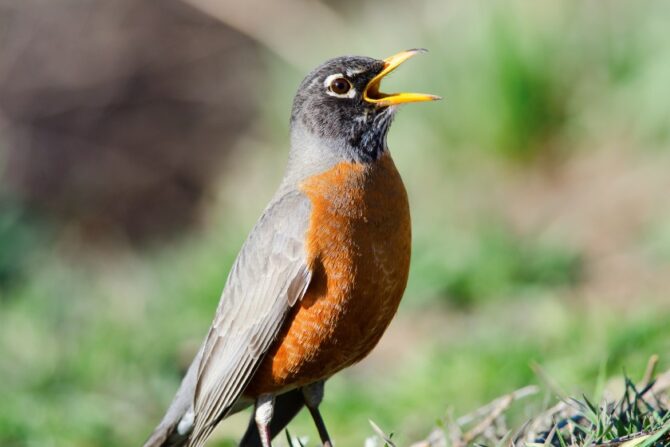
Most birds that sing are males, and their primary motivation is to attract a mate.
As a result, singing is typically more prevalent during the breeding and mating season.
3. They Are Searching for Food
Birds may sing while searching for food to attract prey.
Young and adult birds may also chirp if they have found food but are being threatened by other animals or birds.
Hunger and discomfort can also cause birds to chirp at night.
4. They Are Nocturnal
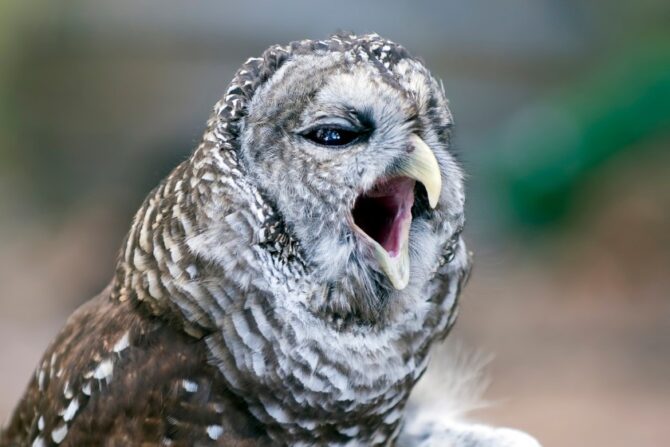
Nocturnal birds, such as owls, sing at night because that is when they are active.
In areas with a high population of nocturnal birds, the noise of these birds may also wake up diurnal birds, causing them to join in the calls.
It is typical for nocturnal bird species to sing at night.
A good example is the black-crowned night heron in California, known for making a “wok” sound throughout the night.
However, you may not notice its nighttime activity if you don’t live near its habitat, such as coastlines, marshes, swamps, and wetlands.
5. They Are Victims of Light Pollution
Light pollution can disrupt birds’ circadian rhythms, causing them to sing at night as if it were daytime.3
Additionally, noise pollution during the day can make diurnal birds sing at night when it is quieter.
Most birds are diurnal and typically sleep at night, while some species are crepuscular and active during twilight.
California, particularly the Bay Area and Southern California, has some of the highest levels of light pollution in the country, which can cause both crepuscular and diurnal birds to sing at night.
6. They Are Migrating
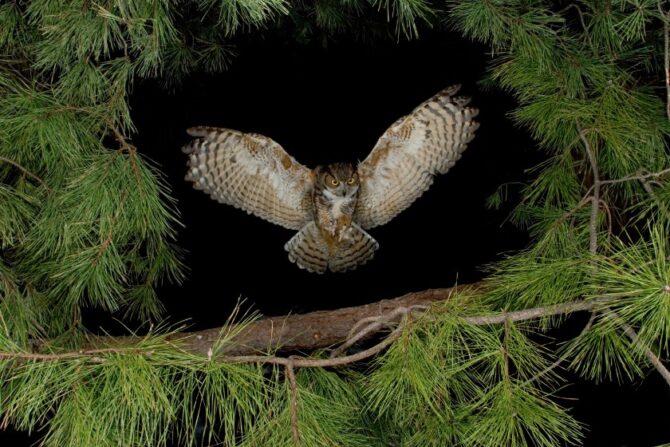
California is a major route and stopover point for millions of migratory birds, which may sing at night while traveling along the Pacific Flyway.
These birds stop in California for several reasons, including access to food and shelter, avoiding bad weather and dangers, flocking and regrouping with other birds, and missing their intended stopover points.
Since many birds migrate at night, their calls may be heard during nighttime hours.
Some of these migratory species include cuckoos, flycatchers, orioles, sparrows, thrushes, sandpipers, vireos, and warblers.
Tips on How to Stop Chirping/Singing Birds from Keeping You Awake
If your sleep is being disturbed by birds chirping outside your window at night in California, there are several ways to help you sleep better.
One option is to discourage birds from perching near your window by covering nearby branches with bird netting.
Then again, this may not be practical for large trees.
Another option is to block out the noise by running a fan or using a white noise machine or insulating curtains.
Alternatively, you can try sleeping with earplugs or noise-canceling headphones.
Lastly, for those with a higher budget, upgrading your home windows to double-paned versions may help.
However, this may not be worth the cost to only block the sound of birds chirping.
Conclusion
All birds that sing in California either sing during dawn or at twilight.
However, many residents have become accustomed to birds singing and chirping at night.
Diurnal and crepuscular birds may sing at night due to the presence of artificial light, while nocturnal birds chirp as they are active at night.
Songbirds sing to attract a mate and establish territory, while flocking or migratory birds may chirp while traveling at night.
Hopefully, with the information provided in this article, you not only know the birds that sing at night in California; you also know why they sing and how to prevent their sounds from disturbing your sleep.
References & Notes
Facts Sources:
- Northern Mockingbird. National Wildlife Federation
- Apparent Effects of Light Pollution on Singing Behavior of American Robins. Oxford Academic
- Light pollution alters the phenology of dawn and dusk singing in common European songbirds. National Library of Medicine
